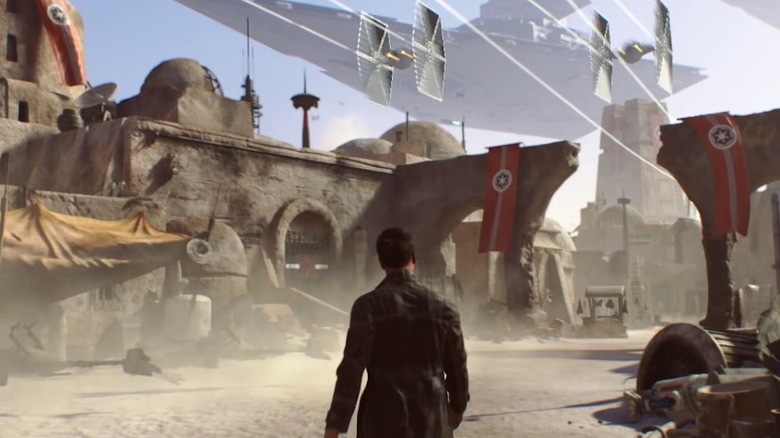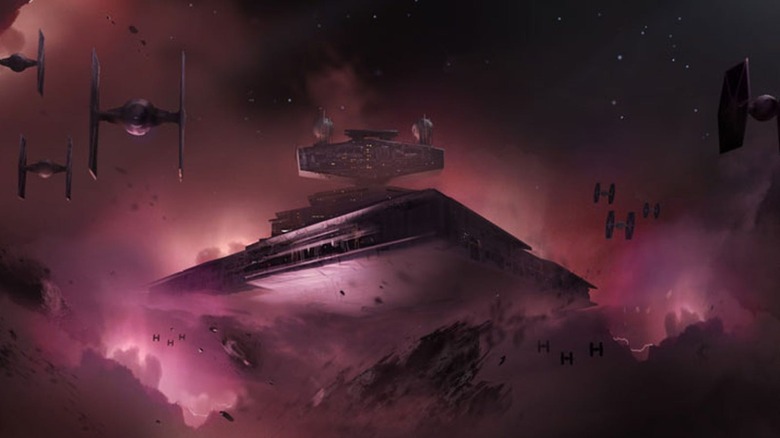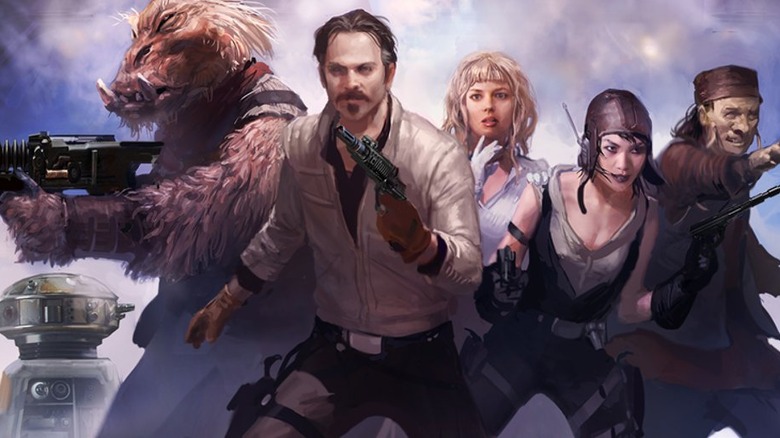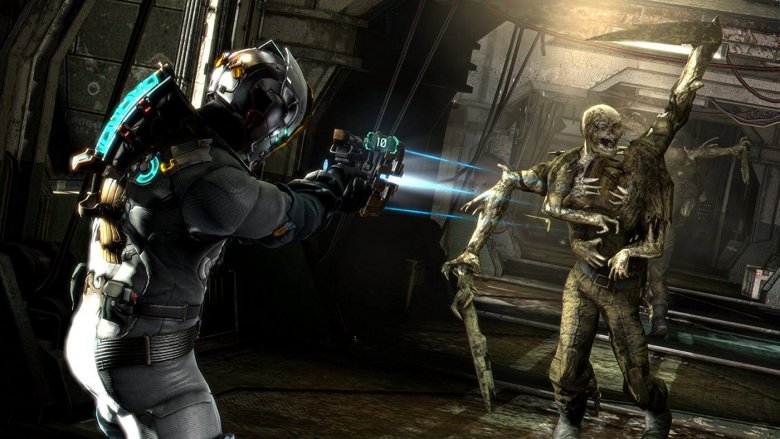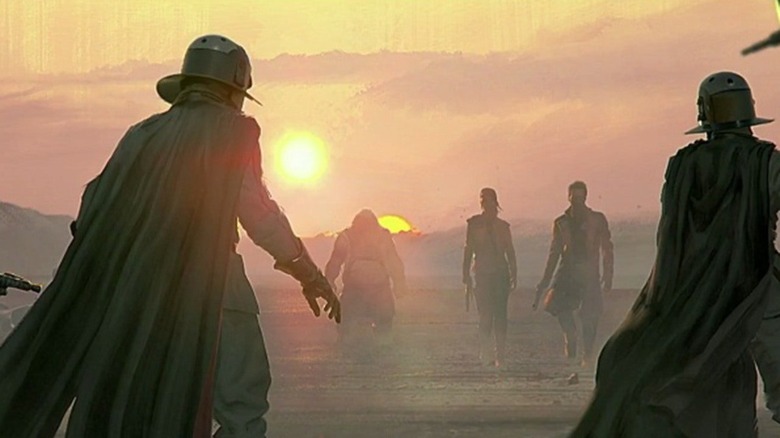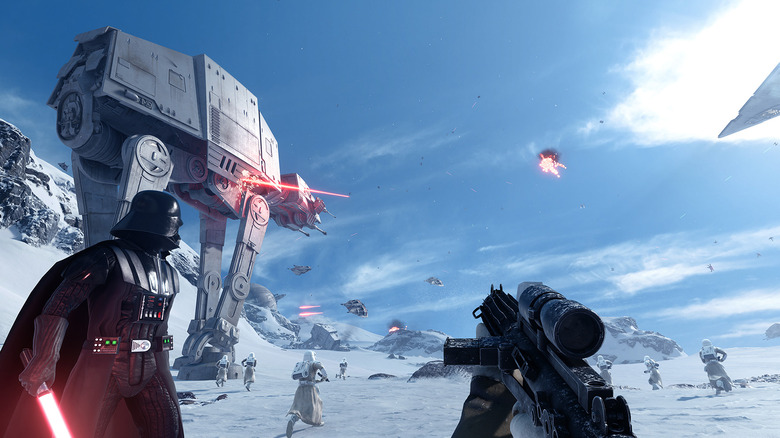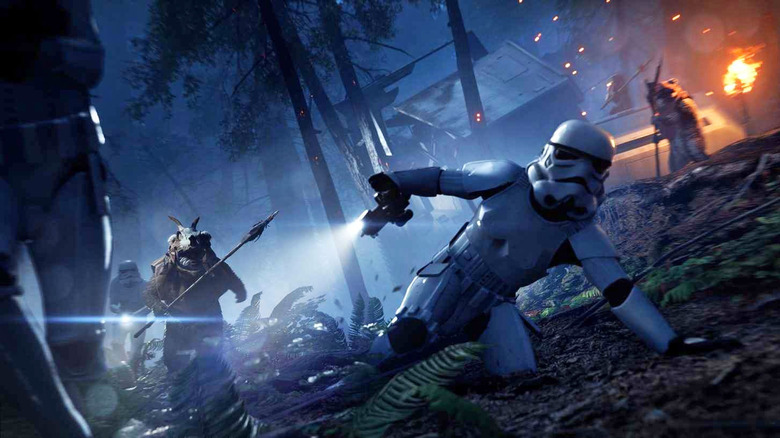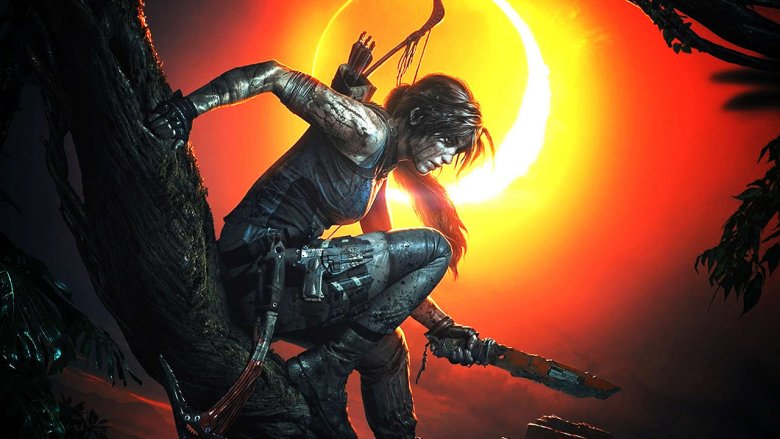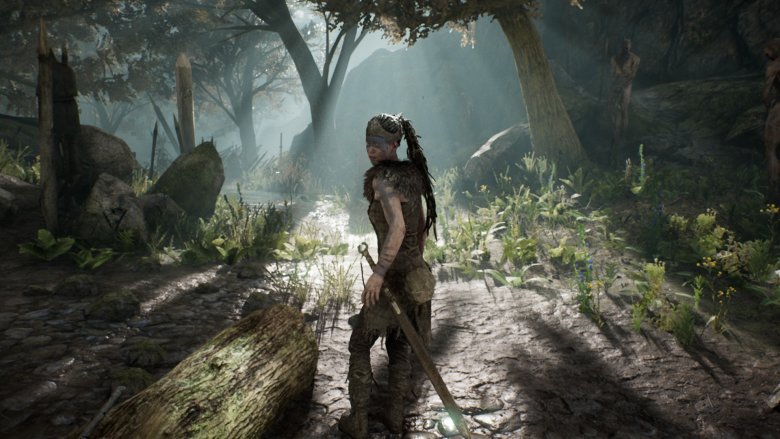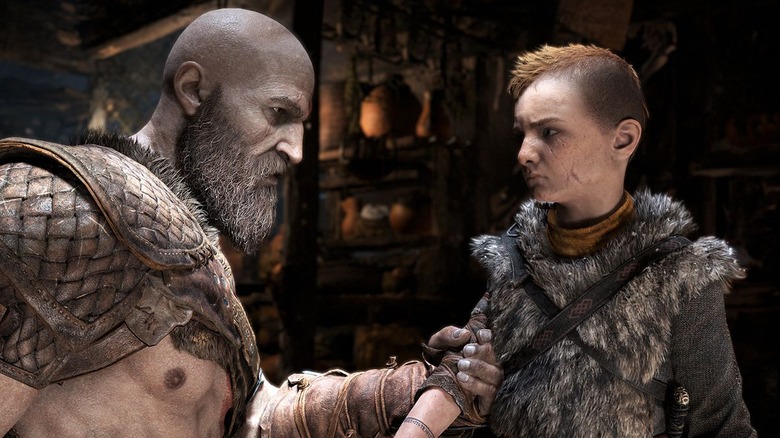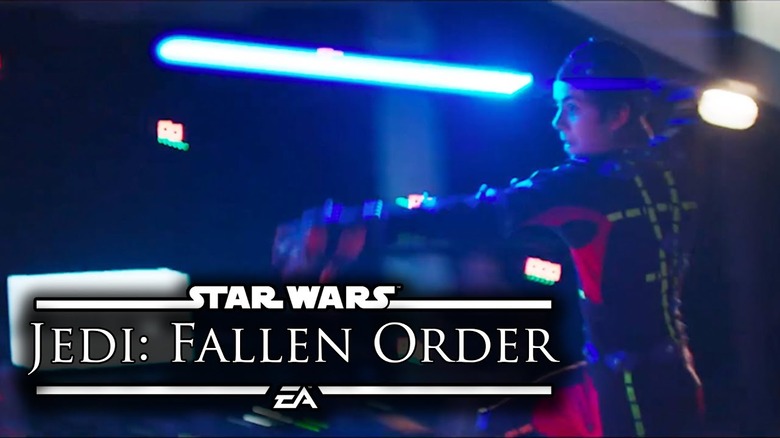The Real Reason The Open-World Star Wars Game Was Axed
Surprise: Electronic Arts is back at it again with the disappointing Star Wars news. This time it isn't because of corporate greed, microtransactions, and what the developer likes to call "a sense of pride and accomplishment." This time, fans' dreams of exploring a galaxy far, far away as a Han Solo-esque rogue in a sprawling, open-world game that would make Breath of the Wild's map blanche have been dashed.
You may not have heard of plans for such an ambitious game to begin with. EA has more or less kept the project under wraps, and in the game's short life, it has had its fair share of ups and downs, which makes the news of its cancellation not so surprising. The game, ambiguously named Project Orca, has been shuttled from studio to studio and apparently very little progress was lost once EA canned the project. But why cancel a concept that was sure to be a success? The name of Star Wars comes with a fanbase ready and eager to buy games and 2018 proved that gamers are still deeply in love with open-world play.
So what's the real reason behind EA's decision?
What could have been
Work started on this mysterious, dream-come-true project in 2013 when EA made the big deal with Disney and acquired the rights to license Star Wars. At the time, everything seemed to be according to plan: the game was given a tentative release date in early 2019 and was being developed by Visceral Games. Best known for Dead Space, Visceral seemed like the obvious choice to make spaceships, planets, and aliens come to life.
Amy Hennig, former Naughty Dog creative director of Uncharted fame, was working on the untitled game with Visceral. At this time, the game wasn't open world, but instead a linear narrative in much the same way that the Uncharted games are. EA seemed optimistic at 2016's E3 when Motive studio founder Jade Raymond announced, "Amy Hennig and team are creating an original narrative in the Star Wars universe with new characters."
The linear action-adventure version of the game was — perhaps too optimistically — given a 2018 release date. However, in the following years, EA would shut down Visceral Studios, change the game into a open-world adventure and put it on indefinite delay.
Ragtag
Here's what we could have had from Visceral: a game, codenamed Ragtag, with memorable scoundrels pulling off space heists. What's not to love about space heists? The earliest version of Ragtag was directly compared to Assassin's Creed 4: Black Flag. Players and their crew would cruise around the stars, boarding other spaceships and hoarding loot. Amy Hennig joined on and put the focus on the crew: players could switch between characters, sabotage stormtroopers, and dodge lasers in first-person shootouts. Visceral pieced together a kind of smorgasboard of demos to show its potential. The crew broke into Jabba's Palace, had some close calls on Tatooine, and ran away from a determined AT-ST.
Although Ragtag didn't get very far into development, we do have some information on the characters we would have gotten to know and maybe even love. Concept art showed a crew of smugglers and scoundrels that were the definition of ragtag, led by the mustachioed Dodger Boon. Possibly playable characters in the crew included the stoic Robie Mattox, gunslinger and member of the Wandering Star crime family; a Force-sensitive charlatan Anzat named Zanni; Gudon mechanic Lunak; rich girl Oona Sable; and medical droid Doc. Taking place between Episodes IV and V, the gang would be navigating the burgeoning war between the crime families and a horrifying weapon that Oona's crime boss mother was getting ready to unleash.
Sounds great, right? Well, in the end, Ragtag wasn't enough to save Visceral Games.
Visceral Games shut down
As promising as Ragtag sounded, it turns out that development had been significantly hampered as Visceral struggled to function under short-handed staff and shrinking resources. As a whole, however, it maybe wasn't the ambitious nature of Ragtag or the apparent "curse of Star Wars" that spelled the downfall of Visceral, but a serious squeeze on developers. Battlefield: Hardline exhausted and frustrated Visceral employees, but everyone was more than onboard for Ragtag. In 2015, executives and producers were let go by EA after the decision to "flatten" the company hierarchy in order to minimize management and give more freedom to creative leads.
Only half of the slow-bleeding team at Viscreal was working on Ragtag, much to the jealousy and consternation of those forced to develop extensions for Hardline. There weren't enough people working on the project, far fewer than the 200 that typically would work on a game of that size. Even those who were working on it were feeling the financial squeeze of San Francisco. The project was so huge that Visceral devs began to doubt if its completion was possible. It didn't help that they were forced to use the Frostbite engine, which was specialized for first-person shooters.
Then EA cut resources after the success of Battlefront, and tensions soared. The plug was finally pulled on Visceral Games — not just the project, but the entire studio — in a move that some people at the company described as a "mercy killing."
Project Orca sank
We lost Visceral Games, but there was still hope that we'd get some sort of incarnation of Ragtag. The soul of the project wasn't dead: EA was still on board for space scoundrels, crime, and Star Wars. However, Ragtag would be transformed significantly as it became the maybe more appropriately titled Project Orca. This game was a whale of a project.
In a blog post by EA executive Patrick Söderlund, fans were told that the project started by Visceral would be evolving into an open-world game: "It has become clear that to deliver an experience that players will want to come back to and enjoy for a long time to come, we needed to pivot the design. We will maintain the stunning visuals, authenticity in the Star Wars universe, and focus on bringing a Star Wars story to life. Importantly, we are shifting the game to be a broader experience that allows for more variety and player agency, leaning into the capabilities of our Frostbite engine and reimagining central elements of the game to give players a Star Wars adventure of greater depth and breadth to explore."
The EA Vancouver took over the project, which would allow players to explore planets and their plunder as a scoundrel or bounty hunter. Because of the shift in direction, the game would be delayed, but it was being made — at one point anyway.
Why???
Ragtag, or Orca, or whatever you want to call the Star Wars game had been six years in the making. There is no telling how much money and time had already been funneled into the project that by all accounts had been exciting and promising. Anything with the name Star Wars on it is sure to grab attention and wallets. But then, EA canceled this incarnation of the project, too. So why, why in the name of all that is good did a perfectly decent game get the boot not once, but twice?
Time, rather than money, is the biggest factor. According to Kotaku, EA wasn't as concerned with the unwieldly nature of the perhaps overly ambitious project, but rather how much time it would take to conquer such a challenge. Specifically, it is alleged that EA is aiming to release a new Star Wars title in late 2020, when next gen consoles will be wowing the gaming world. EA stated that they are "fully committed to making more Star Wars games" and will share more about new projects when "the time is right."
EA and Star Wars: a rocky relationship
EA's exclusive deal with Disney for the rights to publish Star Wars games ends in 2023, and so far the developer has only managed to produce two Star Wars games, one of which was met with infamous controversy that resulted in the most downvoted comment in Reddit history. Perhaps such a rocky reception has made EA hesitant to make new games that will drawn only more ire. Because let's be honest: Star Wars fans are pretty demanding.
As evident in the fandom tantrums that have followed in the wake of new films, nothing is apparently good enough for Star Wars fans. There is nothing that can surpass the perfection of the original films, and when it comes to Star Wars games, there have been few that were universally accepted. Knights of the Old Republic set the bar astronomically high and there has yet to be a Star Wars game anywhere near as lauded.
The name of Star Wars carries a heavy burden of expectation. It has been alleged that EA shoulders it with regret. Former president of EA Frank Gibeau said that everyone dreams of creating Star Wars games back when the deal with Disney was made, but the CEO who inherited the costly deal, Andrew Wilson, is reportedly not as thrilled as his predecessors were. In recent years, EA has been much more focused in on its own intellectual properties like Battlefield while they seem to be waiting out the clock with Star Wars.
Are single-player games dying?
Despite Ragtag being Star Wars, despite anticipation from fans, despite the excitement of the developers themselves, Visceral was shuttered. Of course, there were many factors that led to the studio's demise, but its closure made the games industry ponder: are single-player games dying?
EA has doubled down on the admittedly lucrative idea of "games as a service." Rather than producing a game and leaving it be, today the industry has shifted to an ever-expanding amount of DLC, patches, and online options that mean that games like Battlefront are raking in cash months, even years after release. In 2018, EA amassed $2 billion from its live service games like FIFA and Madden alone. Single-player games don't make money like that. They rely on initial sales, which is why smash hit multiplayers like Fortnite and PUBG will beat out AAA adventures like Shadow of the Tomb Raider in revenue every time.
EA denies killing Ragtag for being single-player, but living, expanding, purchasable content seems much more in line with EA's current practices of slipping in microtransactions, however much that backfired on them with their last Star Wars game.
No, not really: we still love single-player
If 2018 did anything, it was reaffirm the power of open-world, single-player games. The year was bookended with two award-winning smash hits that made millions: Game of the Year God of War wound up being the PS4's fastest-selling title ever, earning $131 million in its first month. Red Dead Redemption 2 broke records with a $725 million opening weekend, which is obviously nothing to sneeze at. This isn't to mention Nintendo's The Legend of Zelda: Breath of the Wild, which we're still searching for Korok seeds in, that came out the year before.
People still love single-player games. Even games that don't have big name studios with dedicated marketing departments enjoy significant success. Before the indie studio Ninja Theory was acquired by Microsoft, they made their own single-player game that wasn't too costly to develop and enjoyed significant commercial success: Hellblade: Senua's Sacrifice. Called a AAA indie, the game is short, sweet, and made a huge impact. Developers specifically focused in on art, combat, and story; all things players appreciate in a campaign game.
However, Hellblade isn't the standard. It takes a lot more to create a AAA game.
High prices and expectations
God of War would have been a much different game without Atreus. The game became the story of father and son, but at one point God of War was going to be the Kratos Power Hour. This almost-decision and definite mistake wasn't because of disagreements in creative direction, but because of a problem with budget. It was going to be too expensive to add in Kratos' skinny kid. Obviously, Santa Monica Studio decided that Atreus was worth the time, effort, and cash. God of War took approximately five years to develop. Meanwhile, Red Dead Redemption 2 took seven years and gathered some serious controversy around the demands it put on devs.
There's a reason why Skyrim keeps getting ported over and over, and it's not because Todd Howard is out of ideas. Developers are hesitant to try to make the next big open-world game because of the cost and years it would take. Skyrim cost approximately $80 million to make back in ye olden times, and were it to have flopped, that's an amount that is hard to earn back. Today's AAA games cost more, take more time, and for some aren't worth the mental toll associated. Studios aren't guaranteed to make their money back unless they pull out all the stops.
These are the things EA was probably thinking about when they pulled the plug on Project Orca.
We will be getting a Star Wars game
In the midst of the outrage and upset over the cancellation of a great new Star Wars adventure, EA has continually pointed out that we will be getting a Star Wars game. And soon. "We're fully committed to making more Star Wars games, we're very excited about Star Wars Jedi: Fallen Order from Respawn, and we'll share more about our new projects when the time is right," EA said in a statement to Kotaku.
What is Jedi: Fallen Order? We're honestly not really sure. The game was announced at 2018's E3 and seems to be set to release in late 2019 — that short and sweet dev cycle that EA apparently loves. The action-adventure game will be set directly after Episode III and detail the story of a lone Padawan who survived the infamous Order 66. Studio Respawn was caught having fun with lightsaber motion capture, but other than that, all other information about Fallen Order is just rumor. While we don't have long to wait for this game, it now has the burden of being the one that was favored over Orca, an adventure than fans were ready to dive into.

